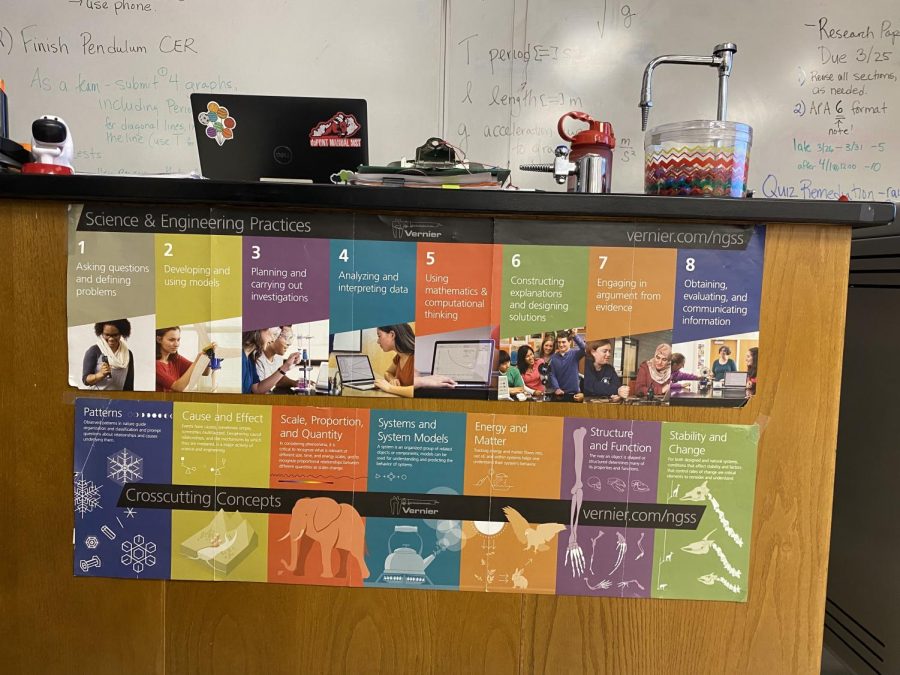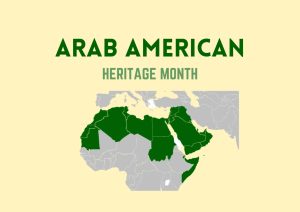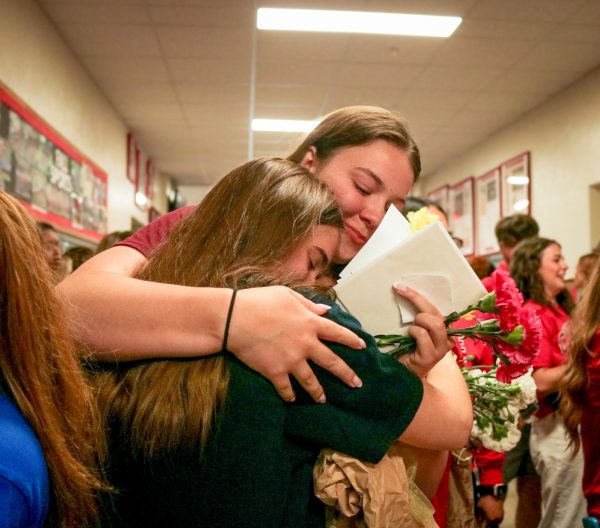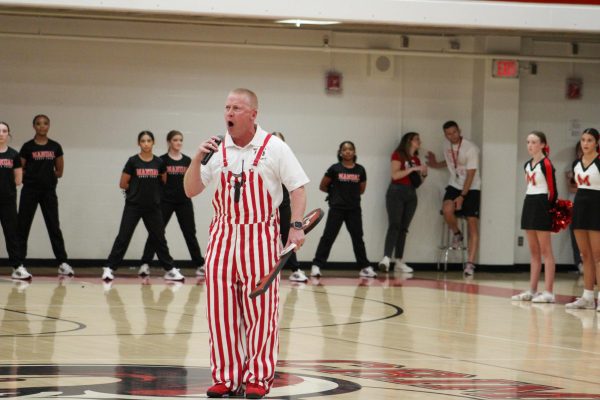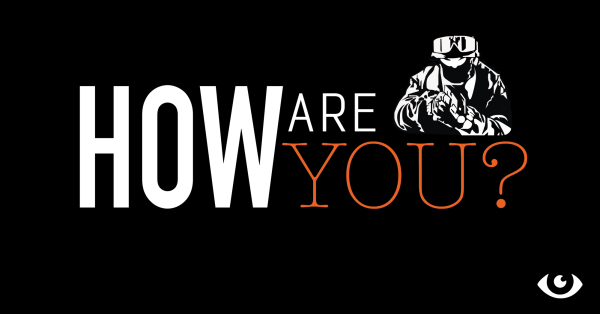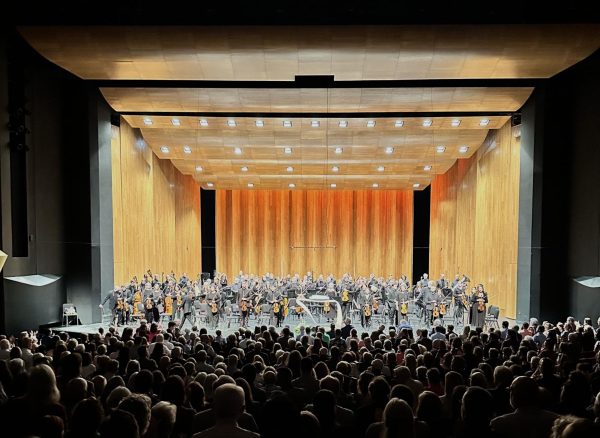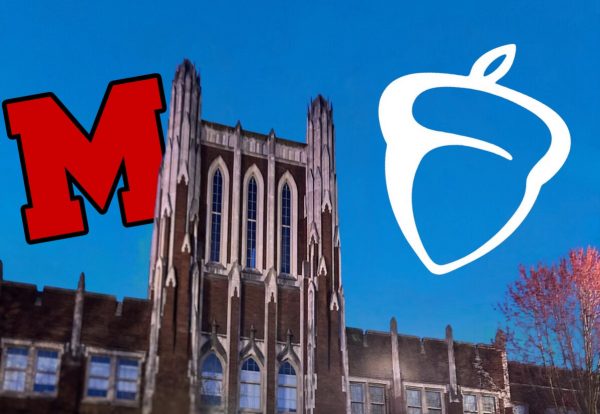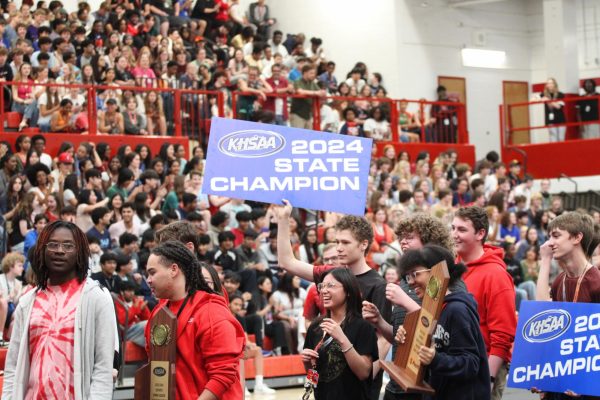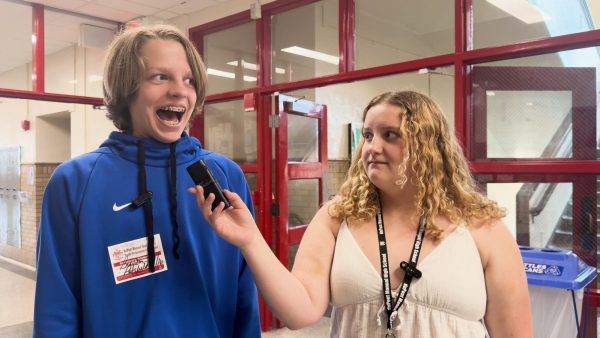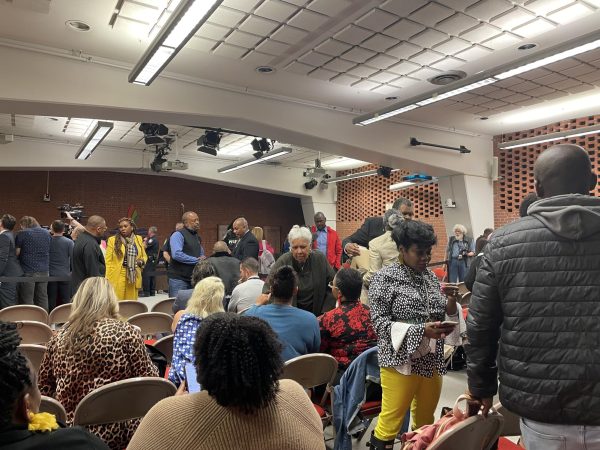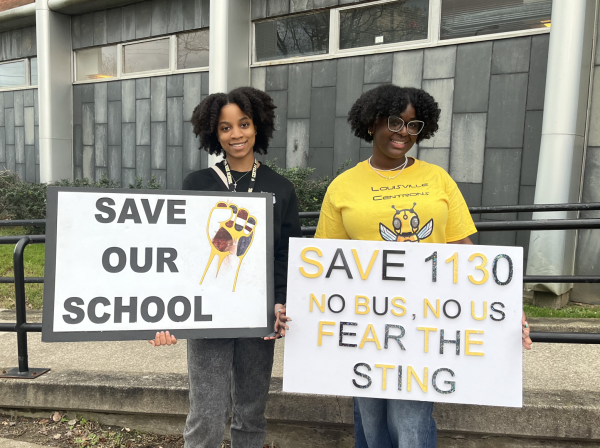Meet Manual’s science teachers
March 27, 2022
Mr. Chris Applegate Advanced Physics and Engineering II
Question: “Did you ever consider any other careers outside of teaching? If so, what caused you to take this route instead?”
Mr. Applegate: “I actually came here from engineering. So I was an acoustic engineer with the Applied Research Lab at Penn State where I worked on submarines and other kinds of sonar, underwater applications. I wasn’t really happy there doing that work so I wanted to branch out. I quit my job in 2012 and then a recession hit so I couldn’t find another one. I started to explore teaching as an option, which kind of worked out for me because I’d done some of that in college. I’ve done some teaching and some tutoring and I enjoyed it. I liked working with younger people and so it just kind of fit.”
Question: “Have you gained a preference towards one subject over other subjects that you teach and is there a reason why?”
Mr. Applegate: “I’m a big physics nerd, and part of it is that when I was in high school, I was really bad at it. I got a D minus in my AP Physics class, I got C’s and B’s in my university Physics I, II, and III courses. When I went to college I got an A in my modern physics class because it was cool. But it all didn’t really kind of click for me until I was in grad school, because my grad school was all physics based. So that always kind of rang in the back of my head and I tried to tell the kids that sometimes this is a really tough subject matter. Sometimes it doesn’t click and it took me 1-8 years for even the basic stuff to really make sense. That’s what I liked, and so it made me really like physics and because it explains everything. It’s hard, and I feel like I have a pretty good handle on how to make it more approachable. But I also really like math, because math is a puzzle. But math can get really dry. Yes, it’s just practicing the same thing over and over and over again. So I like physics a lot more than math because there’s a lot more application that you can do. It’s like there’s a lot more freedom in the course in the standards where you can do application things than there is in math.”
Question: So what are some of the most challenging aspects of being a teacher and then on the latter? What are some of the most rewarding?
Mr. Applegate: “There’s two kind of spectrums of challenging. One is the emotionally challenging part, which is just seeing my students go through hardships, or suffer tragedies, and not really be able to do much to help them. It really takes a toll. Unless you are in the wrong job, or just not a good person, you care about the people in your room. You might not have a close relationship, but you care about them, you care what happens to them. It’s hard to watch these teenagers go through things that I’ve either never had to go through, or I was much more emotionally capable or prepared to go through. The other side of difficult is just the sheer amount of bureaucracy and paperwork. The bureaucracy part is fine. It really takes away from my ability to prepare properly. It’s tough, because it’s a lot of decisions that don’t seem good. But then just paperwork, like grading, I consider grading paperwork. It takes so much time that it gets in the way of your personal life, it gets in the way of your planning time. It hits you, it hits your mental health, just having mounds and mounds of paperwork, and to never feel done. Because by the time you finish one assignment, you’re starting another until you get to that point where you have to figure out what assignments are worth grading because you can be grading your entire existence away. I think that’s a thing that people don’t account for when they assign you students and you get into a classroom. If you have a single assignment that let’s say takes the kids 30 minutes, it takes me a minute to grade each one. That’s 30 minutes right? And I have 150 kids. So 150 minutes, so almost three hours for one assignment. I only have 90 minutes a day of planning. So in that 90 minutes a day, I’ve got to figure out how to grade and prep for the next day or I have to take it home and then that eats into my personal life and sucks away your work life balance. So those are the two main really challenging things.
The other one was good things. Yeah, a lot of good things. The challenging things first get them out of the way, I like to end on a positive. A lot of good things like the relationships you make, the kids are awesome. Got some really, especially here we got some really great kids here. I’ve made great, they’re great kids all over the place. I had great relationships with my kids when I was at Moore But it’s just like having the conversations with students and just seeing their faces light up when they see you or when they’re talking about something, even if they don’t really care about the subject, you can tell when people are friendly to you, and when they like you, because they’ll work with you. They’ll do things and ask questions. seeing kids succeed, seeing people learn something. I really do, like helping people learn things, and helping people accomplish stuff. So I really, I get a sense of enjoyment and sense of accomplishment when my students succeed. When students feel safe with me to come and talk to me and tell me about their stuff that I can maybe help with, or maybe just listen to. I think that’s kind of the nicest thing from this job is you really get to build these strong connections with kids. And you’d like to think that you help a little bit.”
Question: “What are some of your main pursuits for students to take away whether this is content wise, or application to the real world?”
Mr. Applegate: “That’s something that I’ve been kind of trying to think about for a while now. Because this is my ninth year [teaching], and my seventh year here. And this is probably my third year teaching the same core content class in a row, which is really, really nice, maybe fourth. But my first four or five years, I got moved around from course to course, because I can teach math and I can teach physics, so we just kind of got bounced around. So now I’ve had a chance to do things and focus, and then we just went through a pandemic. It’s really kind of changed my perspective on education, especially at the high school level. I feel like for a long time, in going forward, we’ve been putting too much on our teenagers, treating them too much like adults, and putting too many adult expectations on them and college expectations on them. And assuming that, oh, that’s fine they’re from Manual they can do it. It’s like, sure they can, but then they’re gonna do it at the cost of their mental health and it’s a thing that we’ve been overlooking. So for me, coming into this year, my big takeaway was, I want to do things that we’ll learn stuff, and then we’ll find some way to apply it to real life. So they can see that this, this is something that I see in my everyday life. I can explain the science behind it. I can do a little bit of the math behind it. I have not been 100% successful, there are some things that I just didn’t have time to throw together or just didn’t do a good job throwing together because it’s kind of new. But I feel like I’ve done an okay job on some of it. And my goal for my students, when they come into this class, knowing that I almost failed it, when I was in high school is for them to leave having a you know, a good an okay, or a good understanding of physics and in what it means.”
Question: “So what are some activities or hobbies that you enjoy or even you think students would find interesting?”
Mr. Applegate: “That’s easy because I do a lot of stuff. So I’m a big outdoors person. I love to hike and camp and bike and run and I like to kayak when I have a chance, I don’t have a kayak but I like to. I really like any excuse to do outside stuff. I climb and I’ll see students every now and then at Climb Nulu. I don’t climb as much anymore but I’ll see them every once in a while and I see there’s a bunch of graduated students there. So I’m running the Nashville triathlon right at the beginning of summer this year and then I am an avid board game player, and a pretty terrible mandolin player.”
Question: “Is there an activity that you enjoy doing whenever you need to de-stress or detach from school?”
Mr. Applegate: “Yes, that’s a really good question. Because I left out the hobby I’ve been doing for like 15 years and I also do a lot of weightlifting. My way to unwind and de stress from school is to exercise. So I’ll go to the gym or I’ll go for a run. So right now I’m training for the triathlon. So first I will go swim and bike and run or I’ll go to the weight or the weight room just throw weight around, it’s a really good way to exercise is an awesome way to just reset. Or I’ll do some yoga or something right? Something exercising that just lets me reset.”
Question: “Has the triathlon been something that you’ve been doing for a long time now?”
Mr. Applegate: “No, so in 2019, I tore my ACL and 2020 Oh my gosh, what year are we in. So in 2012, the end of 2018. So basically 2020 is when I was doing my rehab, but we were shut down. Towards the end of 2020 I met some people, some friends who were really into running and they kind of convinced me to sign up for a race. So I signed up for a 5K and started rehabbing my knee again, I had eight weeks to do it. So I did it. And then the race got canceled because of COVID. They had also signed up for the Kentucky Mini-Marathon. After a little bit of peer pressure, I signed up for it. And I’d never run that distance before I used to play rugby and so I’m good for short bursts over a long time, but I’ve never run distance before. So I signed up for the mini marathon and started training for that. And that’s my training schedule up there on the wall. After just kind of a little bit of motivation in 2021 I ran three half marathons and a couple of other races. But then going into this year, I just wasn’t excited about any races going on. It’s like I’ve done some, I don’t really want to train, and I was kind of nursing an injury but I wanted to do something because I’m a very goal oriented person. If I have a goal, I’ll work towards it. So I’ve got a friend who does Iron Man’s and that’s too much. I won’t do that. So I was like, you know what, maybe I’ll try a triathlon because I can mix these three things. I’m terrible at swimming. So that’s what I’m working on the most. I don’t want to do this same run I’ve already done. So I want to try something new. So I’ve only been training for it for a couple of weeks now. It’s in the beginning of June. So I’ve got about nine weeks. Which I think I’ll be okay. I’m just worried about the swim. So it’s just kind of new, but it was just to give myself a goal and to do something.”
Ms. Valarie Conti MST Physics (freshman)
Question: “Did you ever consider any other careers outside of teaching before you became a teacher? And if so, what caused you to take this specific route?”
Ms. Conti: “I’m actually a chemical engineer. So I worked for 14 years in process development, engineering design plant, I worked in manufacturing plants. I also worked in supply chain planning in corporate headquarters. So I worked for 14 years. I also taught graduate chemical engineering classes at Manhattan College, which is where I graduated from. Then I took a few years to stay home with my children, I have twins. When they were probably 10 or 12 I guess that’s when I decided to actually consider teaching. I did some substitute teaching at my kids’ school. I thought oh, I kind of enjoy this. Since I’ve taught at the college level, which is very different. But I found that it was very fulfilling, extremely challenging. It also fit with my family’s needs. At that point, my husband traveled a lot on business. I knew if I went back to work, doing what I’d done before, I would travel a lot. It just didn’t make as much sense. So going into teaching where I knew my schedule could be similar to my kids seemed like a good idea. So I’ve been teaching high school now for 14 years. It’s the hardest job I’ve ever done for the least amount of money I’ve ever done. But it’s so fulfilling. I really enjoy learning and interacting with students. I mean, it’s just very, very fulfilling, very challenging, and can be draining at times. But I really feel like I found my passion.”
Question: “Would you be able to talk a little bit about your experience as a chemical engineer?”
Ms. Conti: “So I’m from New York City, I grew up in Queens took the subway to high school in Manhattan. I went to an all girls high school. Honestly, I told my guidance counselor who was a very lovely nun. But I told her I wanted to be an engineer. She had no idea what I was talking about. I mean, it was definitely a time and I won’t say how old I am but I’m older than a lot of the teachers here. It was a time when not a lot of women even considered going into engineering. To be perfectly honest, I didn’t really know what it was either. I mean, I read different things from schools and thought, I liked science, I liked math a lot, and it sounded intriguing to me. It didn’t hurt that it was mostly boys and at the time, I was like, ‘Oh I’m in an all girls school I feel so completely different’. So I’m not gonna lie, that was part of my decision. I really didn’t know what I was going to get into. Once I got into process engineering and materials science, I thought, wow, this is exactly what I like. I just found it really, the application of the science really was appealing to me.
My first job was in R&D [research and development]. I worked in development on laundry detergents. I worked with formulation chemists and they came up with formulas and I worked in the pilot plant and tried to figure out how to scale the different formulations that they came up with and then I was able to demonstrate feasibility at that level then I would take them to the manufacturing plant. It was just it was so cool to go from you know, you started with a beaker and then you went and made maybe 1000 pounds of detergent to making 50 to 70,000 pounds an hour of detergent and sometimes we didn’t always work the way we’d hoped to scale changes things so a lot of things that you know seem on paper to work don’t always translate and so it was just such a fabulous experience because I got to work with the engineers who designed the equipment I then did different things when I was there and I worked on some new products and helped specify the equipment and then we purchased it started up plants and just it to me it just gave me so many different opportunities to be able to literally look at products on the shelf when I went to the grocery store and like I made that like I was part of the team that made that, and just being able to see all the different aspects.”
Question: “So what are some of the most challenging aspects of being a teacher and then on the latter? What are some of the most rewarding?”
Ms. Conti: “The most challenging is always trying to reach everyone and recognizing all the different learning perspectives and trying to develop and deliver every day, lessons and experiences that really resonate with everyone is just really a for me, it’s a challenge. Here, you think of Manual and you think of well everyone is at a level that’s different. While that’s true, I’m sure if you compare, they’re still different, right? There are still differences, especially in different classes and capabilities, and just really trying to focus on learning. To me, sometimes I feel like students often want to focus on a grade. I want to focus on learning and really learning skills that you can take with you and apply across all not just your next science class, but across your life and how you approach anything, be it one day you’ll own the home and you’ll have to make decisions about remodeling your new heating and air conditioning system, and how do you have all of the the tools in your tool kit to enable you to make the best decisions. So I find that is always like balancing and there’s just a million things I want to do so many different things. I think my students would say I always have like six things on the agenda and I’m like, well, we got three today and here we go.
The most I mean the most fulfilling is certainly, I think you can see the light bulb go off a lot of times, and recognizing when students are doing a lab, like, oh, you know, when they discover something or even like today, we were doing a pendulum lab and some of the factors actually don’t affect the period that they were, what they were looking at. Hearing those conversations and having them help each other. Recognizing what the goal was, is so rewarding. That actually did what it was supposed to do. So, because some days go better than others, it’s like anything you think I didn’t quite set that up or if I maybe just did this a little bit differently. I feel like I’m always trying to tweak because there are very rare days, I’m like, that was perfect, I’ll never change it again. But it’s just so fulfilling to see. We just finished Science Fair, we’re still moving through. Some of the students have moved on to state and a couple, I have one freshman who is going straight to ISEF. Seeing how good kids feel when they’ve done something. That’s just for me that’s fulfilling when they really can recognize and feel good about their own work and learning. And so just that, for me, has been the part that makes me keep coming back.”
Question: “What are some of your main pursuits for students to take away whether this is content wise, or application to the real world?”
Ms. Conti: “For me the next generation science standards, or the science standards that everyone follows. For me, the science and engineering practices are what I really try to focus on. It’s about how do you really even ask a question, what are you trying to figure out, what are you trying to do? So you kind of figure out what it is. So I try to do a lot more of CERs, where they have to understand evaluating factors that affect the period of a pendulum. Then how do we set up an experiment to evaluate those and then how do we use that data we gather as evidence to support our conclusion. Because to me, I’d rather them come up with their own thoughts and use good sound, experimental design skills to arrive at what they believe is the evidence they need to support their claim, as opposed to giving them a more cookbook, like here, do this, then do that, and walk away. So that’s why the science and engineering practices are all about how do you analyze data, you know, how do you interpret it? How do you then use math appropriately. I think sometimes, some students, not as much in MST physics, but probably in some of the other physics, the math piece starts to intimidate some people. To me, scientists we’re efficient and so our communication to me an equation gives us a very efficient way to share a relationship between things. So I also say that scientists are lazy because some of our nomenclature, I think, just as a way to, in a very short order, communicate because we don’t want to have to give the the whole bit of information and arguments.”
Question: “So what are some activities or hobbies that you enjoy or even you think students would find interesting?”
Ms. Conti: “I enjoy hiking. I enjoy going to pure bars. I enjoy exercising. Well, I have a dog. I’ve always had dogs. I’m pretty passionate about my dog and enjoy spending time with him. I like reading. I like traveling, I do travel a lot. We’ve been fortunate my husband. Well, I used to travel internationally when I was working but also my husband has had a lot of travel opportunities. We’ve been able to travel through most of Europe, Japan, Central America, Canada. So we’ve seen a fair amount of the world. But there’s still more I want to see.”
Question: “Do you have a bucket place spot that you’d like to hit?”
Ms. Conti: “I’d like to go to Egypt. And I think what else? Egypt’s pretty high on the list. We loved Greece, so my niece is getting married in June. So we’re going back to Italy. That’s where she’s getting married. The food’s fantastic. We went on our honeymoon to Paris. We tried to go to a smaller restaurant. This was really before the internet was even a thing. We went to one restaurant, and we had no idea what we were eating. I mean, we left and we had no idea. But it was so good. It was in French. I had under the table, I had my little translation, we tried very hard. I mean, neither of us speak French at all. But we tried. And we had the book, but we couldn’t figure it out. But we just kept eating it and it was very good. So we figured whatever it was, it was a good experience, though. I feel like when you travel you should enjoy the local cuisine and culture and everything and sometimes even if it’s not quite within your normal comfort zone, it’s still what makes it fantastic.”
Ms. Alexis Rich AP Physics 1 and Advanced Physics (juniors)
Question: “Did you ever consider any other careers outside of teaching? If so, what caused you to take this route instead?”
Ms. Rich: “Yeah, of course. When I graduated from college, with my bachelor’s, I thought about a career in research. I also at the time, pharmaceutical sales were huge and that was actually what my major was, it was Chem Business, with an eye to work for Big Pharma. But it wasn’t meant to be. My high school principal called me a little bit after Christmas, saying they needed a math teacher. Then I just decided to switch careers and be a teacher.”
Question: “What have been some interesting experiences in the different grade levels you’ve taught and the different subjects you’re taught? Or even if you’ve taught at different schools, how were those experiences different?”
Ms. Rich: “Well, I mean, I’ve taught just about every level of physics here at Manual. I’ve taught chemistry a couple times, because I’m certified to teach that. I have taught at a lot of different schools around the district. So I’ve taught at Manual and I’ve taught at Shawnee, which have the distinction of being the highest rated and the lowest rated schools in the district. I have to say, there’s a lot to love about teaching at both places. I did a few years at J-Town, which was sort of a school in the middle. I have to say, some of the most rewarding work of my career has been working with career and tech-ed kids, so kids who wouldn’t necessarily pursue a career in the sciences, but would use science in trades like welders and electricians. A lot of that hands on application was just a blast to teach. I really loved doing that.”
Question: “In those experiences, do you notice some differences or even similarities between your classes?”
Ms. Rich: “I think that no matter what your background because you know with MST students they obviously have a geared toward science, but in my junior class I have all kinds of kiddos. AI think, regardless of your background, I think that physics is relatable to just about anyone. You know, my musicians, we were doing, you know, physics of sound in my junior class. As you can certainly see it, we’re getting to the point now where we can relate it to some of the calculus that they’ve done. So, the fact that physics is relatable to students on so many levels, and they can see those real world applications and say to themselves. I think it is really cool. I think the fact that it ties into subjects at all levels is pretty awesome.
So like my dancers, I can’t remember what we were doing. But there was something that we were doing with my dancers, that was cool. Then with my Advanced Juniors, we’re actually gonna partner with some kids in a park studio. In the spring, later on, where we’re going to do sort of an art project, where we’re going to use physics concepts to make paintings just like that Vermeer, over there that was actually done with physics was done and it’s almost like painting by numbers. It’s really cool. So there’s a lot of collaboration and then with the MST kids, it is nice, especially at this level to bring in their calculus and their chemistry, and all of their science knowledge, sort of like a capstone. It is cool. It’s really great to see the light bulb go off for a lot of kids. And to get the light bulb with kids who wouldn’t normally be into science. I think it’s really that’s super rewarding.”
Question: And that actually hits into some of my other questions is, what are some of the experiences that you hope students can get out of your class that can be applied to the real world?
Ms. Rich: Well, at the end of the day, what physics is about is problem solving. And that is a skill that everybody, regardless of their career is going to have is going to need. I mean, in terms of problem solving, I mean, you need that to retile your bathroom. And so what physics is, is a sort of a guideline for, you know, systematic approach, approaches to problem solving. I just hope kids, especially because we need it, I kids become good problem solvers. That’s what I want.
Question: “So what are some of the most challenging aspects of being a teacher and then on the latter? What are some of the most rewarding?”
Ms. Rich: “I’ll tell you, what has been challenging is, you know, I’ve been teaching for 20 years, and I’ve had 17 different principals. Just when I feel like I’m getting started, you know, administration changes, and anything that you want to do sort of outside the classroom, or any sort of building in the school, it comes to a halt when leadership changes. So the principal turnover and the admin turnover for me has been a huge challenge. Probably the biggest because everywhere I go, within a year or two, the principal leaves, and that is without fail. So that has been huge. But in terms of rewarding. I’ve been to all the graduations, wherever I’ve taught. Definitely manual. I always go to graduation at Ballard. But I went back to see my Shawnee kids graduate. I went back to see my Collegiate kids graduate, I went back to see my J-town students graduate. I never miss graduation. Because I think that is what this is all about. I’ve sat through, 40 of them and I just, every time there is something hopeful and positive and rewarding, and it’s just good vibes, man. Never miss graduation, never. And I haven’t missed one for students who I’ve taught. Every class has its own personality and they’re just things I wouldn’t miss.
Just sort of over the years, the demands on non-classroom, and non-teaching activities, paperwork and meetings, and things that take time away from teaching and students that don’t really make a difference in the end. And that has been, I mean, that started, you know, early on in my career. And that’s, that’s been very tough. I mean, I worked for Dr. Polio at J-town. He was the principal at J-Town when he hired me. And one of the things he said, and he still says this, if you listen carefully, he said, ‘There are two types of people who work in education, there are teachers and their teachers, and there are people who support teachers’. And those are the only jobs you have people who are in the classroom, and people will support those in the classroom. I feel like lately, the support folks in the classroom are not so much helping as in creating more work for me to do. And so that, unfortunately, has been a source of great frustration for the past few years. Also, I think that in terms of teaching and learning, I think grades have become just a huge barrier to learning. When, when all that the outcome is measured by as a grade. I think both students and teachers aren’t doing their jobs. And also, I mean, there are plenty of students who get A’s and don’t learn anything. Yeah. And they’re not asking the tough questions of why am I in this class? Why do I have an A and why don’t I know anything? And so I’m, you know, grades have just gotten to the point where they, the A is the expectation, but the learning is secondary. And it’s unfortunate. Kids complain when they don’t have an A, and are learning stuff. But they don’t complain when they have an A and they aren’t learning anything.”
Question: “What are some of your activities or hobbies that you enjoy outside the classroom and maybe something that students would find interesting?”
Ms. Rich: “Oh, grading papers! No, I’m just joking. I mean, I bike to school. I am a triathlete. Not a fast one, but I finish them. I’m a competitive jam maker. Which there’s not a lot of that. I like to putter around the house and cook things and garden things. I’m like Martha Stewart without the staff. I am an avid reader. I think folks know that I run the book club and I’m very proud of that. I’m very proud of my push for literacy, especially as a science teacher. I have a dog. All of that stuff is stuff that I do in the summer. There’s not a whole lot that I get to do during the school year. A lot of it’s during the summer.”
Question: “Is there an activity that you enjoy doing whenever you need to de-stress or detach from school?”
Ms. Rich: “I think I’m not so much detached from school, but I do my best thinking when I’m riding my bike, or if I’m swimming or if I’m running. I need something to sort of ponder so, I mean, that’s not necessarily an escape, but it’s a good time to think. I mean, it sounds nerdy, but I get lost in books. I mean, it’s really nice to sit, I love to sit and read in the summertime. Go through a book a week in the summertime, it’s really great.”
Question: “What are some future pursuits that you hope to implement in your own classroom to help students continue to grow further?”
Ms. Rich: “Well, like I told you, every year has been a new year. I’ve been teaching for 20 years, I’ve got about 10 years left and studies show that teachers kind of taper off at like 15 to 17 years. I’m still doing new labs, and still being creative, I have to say that in terms of the classroom, I don’t really see any problems keeping that fresh. What I think the new chapter is in my career is, now that I’ve been teaching for 20 years, I am taking on leadership roles in the teacher community. I just got elected to SBDM. I’ve never run before, I’ve always taken my name off the ballot, because I just never felt ready to do it. This afternoon, one of the reasons I can’t meet this afternoon is because I’m leading the Physics Teachers Alliance for not the district, but the whole county, and even more. I know that you wanted to frame this within the classroom, I’ve kind of hit my stride in the classroom. Now it’s time to look beyond the classroom and look in those leadership roles. Let me make this very clear, leadership roles within teaching. I have no aspirations to become an administrator. I want to be a teacher leader, and not an administrator because I think that being away from students would be miserable. I have to be near students.”
Ms. Keri Polevchak AP Biology, Advanced Biology, MST Biology
Question: “Did you ever consider any other careers outside of teaching? If so, what caused you to take this route instead?”
Ms. Polevchak: “I never wanted to be a teacher, ever. I was a Biology Chem major in college, and I was president of my honor society, and I just knew I loved biology, but I didn’t really know what I wanted to do. I thought about med school, but I really liked pathology. I worked on cadavers a lot and I really enjoyed that. I know that sounds weird, but I did. So I was kind of leaning towards pathology, doing something like that. But my junior year, I was president of my national honor society for biology and I was in charge of setting up Science Fair for high schools, and I loved it. I loved working with the high schools. And I was like, Mom, Dad, I think I want to be a teacher. My parents were like, what? So I actually took my MCAT and I passed, so I could go to med school. But nobody in my family had ever went to college. My parents were like, well, we don’t want you to have any regrets. Take some education classes and see, like, make sure that’s what you want to do. So it didn’t lock me and I could see, and I loved it. So I never looked back after that. Then in the summers, I would work at different doctor’s offices because I do have a biology chemistry degree. I never looked back after that.”
Question: “How’s being the magnet coordinator for MST and then also having aspects in Science Fair, but how has that experience been for you?”
Ms. Polevchak: “Super super challenging so when I first came in, it was changing a lot of stuff. It just wasn’t very fluid, we didn’t have a lot of solid protocols that everybody could follow. Before us, Mr. Zwanzig, kind of just did everything and didn’t teach anybody anything. And just honestly did whatever he could. So when I came in, I wanted to have this kind of protocol that anybody could follow and start making handbooks and starting to have systems for everything in place. So that’s been really challenging. We also don’t get a budget from the school. All our money for MST comes from fundraising. So that’s really challenging. Fundraising or if students win certain awards, sometimes we’ll get stuff from the school. So that part is challenging. Then with MST coordinator, it’s also MST applications. Then Science Fair is so much time outside of school that you don’t get paid for. The average teacher does a lot of work outside time that you don’t get paid for but being MST coordinator and Science Fair, like just the applications alone, it’s seen probably every day, it’s hours. And that’s on top of teaching and prepping for class. It seems like for me it probably works out to me getting like 10 cents an hour. But I do it because I love the kids and I want the program to be successful.”
Question: “What have been some of the most rewarding aspects of being a teacher?”
Ms. Polevchak: “I think just the relationships that I develop with the students, I always remember a few years ago, when we were on NTI, and we had to have a year of normal, I always remember teachers being like, I can’t write recommendations for them, I don’t know them. And I was thinking, I know, my kids, I can write a recommendation, and so I think those relationships that you develop with students I feel like almost all my students I really know. I know what they do and like what they’re gonna do and like probably more than they want me to, but I feel like I know them at a very good level and what they’re capable of and what they need.”
Question: “On the latter side, what are some of the most challenging aspects of being a teacher?”
Ms. Polevchak: “I would say class size, diversity and little resources, what we have to support those things is really challenging. So like, a lot of my classes are 31. And it doesn’t matter whether my class is 31, or 20, or 10, I get the same amount of money for my class each year. It’s really challenging to get the resources you need. Also, when you have a class of 31, and you’ve got students struggling, and we don’t really have many support systems to help them other than what I can do, that makes it really challenging too because to me there’s no reason a student should ever fail. It’s really hard when I’m the only one that can help, I feel like that’s the biggest challenge for me. I need somebody else to step in and be like, I can help too.”
Question: “Have you taught at any other schools besides Manual?”
Ms. Polevchak: “Yes. I’ve taught at Ballard. I taught at South Oldham and I’ve taught at Paducah. Tilghman High School, when I first started teaching, that one was my most challenging. I basically collaborated with a parole officer. I had some really, really rough kids, like students. The problem was a lot of them are 18/19. And I was only 21. So I think they all thought like I was dateable. They think it’s the same, it’s not the same once you go to college. So that was really challenging, because I had a lot of unmotivated students. I remember I started a book club because a lot of them had never really done that. I would meet with them, and I’d pick a book. So when they graduated, I got them all a book. Those kids actually went to their baby showers like that. But I would look in the paper everyday like please don’t have any of my students. It was a lot rougher group there. So that was really challenging.”
Question: “What are some of your main pursuits for students to take away whether this is content wise, or application to the real world?”
Ms. Polevchak: “So for me, I try to get their first year of college biology and teach them the organizational skills. So no matter what, even if you don’t major in biology, you have to take a science, so they can have an easy freshman year and just fly through. That’s one of the goals and I get so many emails when they go to college, like, oh my gosh, this is such an easy class. But really learning to work with other people and people that are different from you, that may think different from you and kind of appreciate the strengths of each other. I feel like with biology, we can do that for so much. Like on the microscopes, for example, somebody who’s really good with the microscope, and other people aren’t good at, you know, you start to see the strength of your classmates. The ability to help each other and just honestly be good people. I have a lot of colleges that are calling now that ask me about what type of students they are, but then what type of person they are. And I think that speaks volumes, because they didn’t use to call about things like that, but now that they do. Then I hope that because of me teaching biology, I always hope that they leave with stuff they found interesting. Even if you don’t like science, hopefully, you found some content that you thought was pretty cool, and that you can see the value in it.”
Question: “What are some activities or hobbies that you enjoy on your own time? That might even be interesting for students to hear?”
Ms. Polevchak: “My own time? I don’t have much of that. So during the school year, I seriously have no time, like, I don’t think I have much. Well, at least from October through March. So by the time we get to spring break, I’m okay. But October through March, I have no time. It’s always something like MST applications, Science Fair, something’s always rolling in. When I do have free time, I just have to sit. But other than that, when it’s outside of that time range I love to do puzzles. I’m a big puzzle person. I have like one of those puzzle boards. I find that most people find that stressful, but I find it very enjoyable. I love to garden, so I’m really big into my gardening. Actually, I set up my beds this past weekend and kind of composting and doing stuff like working in the yard. Then I love to paint. Then once the summer hits, I go to tons of concerts. I’m a big music fan. I always go to Louder Than Life, Bourbon & Beyond, all the festivals. I usually have probably 5 to 10 concerts a year, when it’s not COVID.”
Question: “Are there any favorite concert experiences that you have?”
Ms. Polevchak: “Yes, I’ve got a lot. One, well actually, I have favorite people, but it was a unique experience. So Ms. Moss and I usually go to concerts together and our first Bourbon & Beyond was a giant mud pit. It was like total downpour and we were in a complete mud for 12/14 hours straight. But at the end of that mud pit terribleness was Lenny Kravitz and John Mayer and that was the goals for me that day. So it was worth it. But I’ve also, Janet Jackson was fabulous, when I saw Janet Jackson. I’ve seen a lot of really great and all kinds of different types of music. Except for country. That’s because I grew up in Cleveland. So it wasn’t really because I didn’t like it, I just was never exposed to it growing up.”
Question: “Is there anything else you’d be willing to share that wasn’t mentioned?”
Ms. Polevchak: “I do like to travel so I always have a few trips in the summer. One is always with Ms. Moss. I always have a family one and then I have a Ms. Moss one. This past year, in November, we went to New York City. It was awesome. We saw Harry Potter and so we are always trying to have something we’ll enjoy. Then we both have summers off. So like this summer we’re gonna go to Seattle and see her dad. One of these times I’m gonna make it to Norway because Ms. Hafael, she’s one of my really good friends, she got a house in Norway and they got a little guest house, so I got a little spot I can hang out.
I went to Japan. Oh, for a whole summer. I got picked by the Toyota Teach program to represent Kentucky. And so they paid for my whole trip. And I got to fly into Kyoto and that was awesome. And then I went to Hiroshima, I went to Tokyo city. We took the speed rail, and went all over. I spent basically a couple of weeks in each city and it was absolutely amazing. We got to see everything you could possibly imagine in Japan and the whole place was trying to incorporate more culture in teaching and get examples of that. I didn’t know any Japanese, but that was okay because they have to learn English. They don’t get a choice on their language. They were so kind and always helpful but the biggest thing for me was the culture shock when I came back to Los Angeles, because it was so quiet and peaceful. Like, there’s so many people, but it’s calm.”
Mr. Michael Starling AP Environmental and Advanced Chemistry
Question: “Did you ever consider any other careers outside of teaching? If so, what caused you to take this route instead?”
Mr. Starling: “When I was in high school, I thought I wanted to be a chemical engineer. I really enjoyed chemistry. As a student in math. I thought chemical engineering was going to be a nice mix. I had always gone to school thinking, some form of chemistry and I looked at pharmacy and a lot of other majors in college, but eventually settled on chemistry. Got my bachelor’s in chemistry, then went to graduate school for a PhD in chemistry, and had planned on being a university professor. I had entertained some ideas, maybe being a master brewer for beer brewing because my training and chemistry in graduate school. I worked with a lot of microorganisms and it was around 2010. So a lot of the craft brewing was really starting to ramp up. That seemed like kind of an interesting field to maybe get into and have some fun. But somewhere in graduate school, I kind of had a heart to heart with myself and realized I really enjoyed working with young people and students. I’ve always done tutoring, and I’ve always done outreach to help with kids in college and high school. So I decided somewhere along there that I would pursue teaching, and then it kind of then came to teaching. In my gut, when I was like, in high school, you know, there was an epitome of that thought about teaching, but I did look for other avenues first, and then came back to teaching.”
Question: “What are some of the most challenging aspects of being a teacher and then on the latter? What are some of the most rewarding?”
Mr. Starling: “Chemistry tends to be a rather challenging course for students here. So teaching MST and then teaching advanced, like, the way that I would teach things for MST may not necessarily work for advanced. So putting in work to change the curriculum for advanced and make it more targeted for that audience. A lot of students here are very, very talented. So thinking of ways to raise the bar and to raise my expectations and to bring more rigorous work was something I was really worried about my first year. On this actually, I remember one of my students writing about it, because I did six week kind of reports on feedback from my kids like what’s going well, what’s not going well. And one of the kids wrote, you know, after you got comfortable and kind of got over the oh, crap I’m at Manual phase of things, things really opened up, we felt we were able to talk to you more like you felt more comfortable asking questions. That’s been a really big challenge here, when a kid doesn’t understand something is getting them comfortable enough to ask a question. I’ve had many kids who have told me, you know, it was a test, I didn’t know, I could ask you a question. I said, you can always ask a question because I control the information I give back to you, I can always say, ‘No, I can’t answer that’ and you’re just in the same spot that you were. But if you ask me the question, then I can decide whether or not I want to give you some information or give you a hint or kind of scaffold that will lead you to the answer. In trying to get over that barrier of not being intimidated by asking a question in front of their peers or feeling like they’re stupid or dumb for not understanding a topic the first time. Kids being comfortable with failing. That’s probably been one of the biggest challenges here and working with kids.
The successes that come are usually at the end of the year. I’ve got notes and letters or artworks from pieces of kids. I’ve had many kids that have painted the window shades for me on request and had no issues there. I’ve asked a kid here or there like, ‘Hey, my mom’s birthday is coming up, would you make a card?’ and they would make a card for me in small things like that. Like this email here: just getting those kinds of messages where, you know, these are kids I’ve not necessarily ever interacted with, just them feeling valued. Then feeling comfortable to ask questions or to come for help or to when they’re a senior be like, ‘Hey, can I aid for you?’ It’s the small things. I’ve had students email me when they go back to college and say, you know, hey, I’m in college, and I remember all of this from class. So I just want to say thank you. My first year in Advanced Chemistry, they wrote on their desk, like the diary of a stressed out Manual kid during chem, and by the end of the year, they decided they wanted to major in chemistry. They have went through and were at UofL majoring in chemistry. I’d stayed in contact with them and they told me they wanted to stay majoring in chemistry because they enjoyed class and they felt like I would be upset with them if they left the field. I want you to do what’s gonna make you happy. This is your career so I’m thrilled that you even thought to give chemistry a chance but if you like business, do you I think go do what makes you happy, I’m going to support you regardless of what you’re doing.”
Question: “What are some of your main pursuits for students to take away that they can apply in a real world aspect from your classes?”
Mr. Starling: “Specifically, Environmental, we get into some political pieces, and I try to challenge kids on what they believe. My goal is not necessarily to believe what I say, because my beliefs are my beliefs. I don’t necessarily think that they’re what you should believe based on your experiences. My experiences have shaped those. But just be willing to, to challenge yourself on those and the things that you hold, and to have some, some difficult conversations that, you know, you may walk away, just like, not agreeing, but you’ve at least thought about the other side of the issue. You know, growing up in Eastern Kentucky, and then moving to Louisville, a lot of people here aren’t necessarily as familiar with coal is part of a culture in Eastern Kentucky. So we get a lot of people in Environmental that are like, ‘Let’s get rid of coal’ but they don’t necessarily see or understand what’s going to happen in Eastern Kentucky to people, how that’s going to affect them, how that’s been a part of their lives for 100 years as a family thing that they’ve done. When that has been one of the big employers in a lot of those counties, pulling that away without having a plan to kind of replace that or to at least talk to those people and figure out because this is why we want to transition away from coal. So just trying to give that perspective of things. I try to do a lot of projects or application based labs, especially in Environmental. So they’re thinking about complex issues, even, you know, even if some of them are simplified, or they’re not necessarily sure how they would solve that problem. Just considering, some of these challenging problems are going to have in the future that they’re going to be dealing with in 10, 15, 20 years. I think it’s good to expose kids to those challenging situations.”
Question: “What are some activities or hobbies that you enjoy, and then even something that students might find interesting?”
Mr. Starling: “I enjoy playing Ultimate Frisbee, like Mr. Elliott and I went to college together and played ultimate together. Mr. Kuo and I went to graduate school and played ultimate together. So Ultimate is something that has been a big part of my life. Actually, before I started teaching, I had an offer to go work for an ultimate company down in Atlanta. I had a conversation with the owner of the company because we were friends. And he told me, ‘You know, my guy, I’d really like you to work with us but this isn’t a career type position’ so I was wanting to transition more to a career type thing. That option was on the table, but I chose not to and pursue education. I really enjoy playing computer games and video games. My wife is a big hiker, so I spend time hiking with her. Most of my friends live in other places. So finding times to coordinate where we can kind of meet up and hang out. I got friends in Canada, friends inColorado, so they’re all kind of spread out, we’ve kind of a cluster. So doing that. I mean, I enjoy cooking and baking. I like looking at research and just kind of like learning to read articles online. I’d like to read books, but I kind of get distracted or halfway through them a lot of times. It’s tough because my wife will read 80 to 100 books a year, so she’s always just churning through them. I would say that’s probably during the school year that sums up a lot of my time. You know, out in the summer, it’s kind of hanging out. I like gardening and planting flowers. Go spending time with my parents. Both my parents are in their 70s so I mean, the time is approaching for them. I want to enjoy that while they’re around and in good health as much as possible.”
Question: “The last question I had was actually proposed by students. A lot of students are interested in the bromance between you and Mr. Kuo so if you could touch on that a little bit like a history?”
Mr. Starling: “So Mr. Kuo and I met at Vanderbilt in 2011. It was my second year of graduate school, he was coming in his first year, we had both played ultimate. What’s funny, and we didn’t figure this out until later, is he went to Grenell, in like 2005, or 2006, both of us had gone to a Frisbee tournament in Wisconsin, and we actually played against each other at that tournament, and there are old pictures. We were able to go back and be like, Oh, we see each other in like the pictures playing against each other. So that was really cool. We were both the graduate students on the Vanderbilt Ultimate Frisbee team with a lot of undergraduates. So kind of being the the older guys who had already been through undergrad. So having somebody who was also older there, it was nice. Somewhere in 2012 I took a break from graduate school because of mental health reasons and I ended up leaving the apartment I was living in and moving in with Mr. Kuo. I slept on Mr. Kuo’s futon for quite a while. There we played a lot of League of Legends together and cooked together. We found out we had a mutual friend as well that we knew so that kind of brought another piece into it and that that guy is somebody who we’ve stayed friends with and is a part of our close inner circle. When we were both in Nashville, we lived together when I left to move to Louisville you know, he stayed in Nashville for a while so we were apart but we would visit each other. He was still staying with our friend group. So I went down there one summer, and we would hang out. Then when he decided that he was ready to leave Nashville because that kind of group of people we were with, they were moving on, you know, somebody’s going to law school, someone who’s going to graduate school elsewhere, he decided he wanted to pursue teaching. So I actually returned the favor, and he came and lived with me for about nine months or so until he worked out where he was going to stay and what he was going to do and if education was going to be the right path for him. We’ve known each other for the last 10 years. Being able to work with my best friend on a daily basis is fantastic. The year that we both got to teach advanced chemistry together was really awesome. Because we’d spend a lot of time hanging out and then talking about school, after school, and that was a lot of value added because we come at education from two different ways. So just that whole merging has been a really a really fun experience. You know, he comes down and we’ll celebrate certain holidays with my family and when his mom is in town, we always go over and see his mother and talk to his mom and hang out so yeah. Seeing it last year in the yearbook was an interesting thing. It was kind of fun to see but I mean getting to work with one of my best friends, a guy who’s the best man at my wedding is just awesome.”


